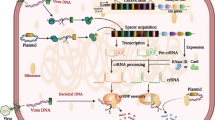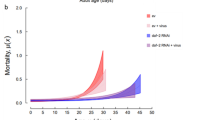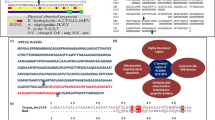Abstract
Endometrium is one of the most commonly affected sites in genital tuberculosis. The understanding of its interaction with the tubercle bacilli is of paramount importance for studying the pathogenesis of this disease. The main objective of this work was to study the interplay between Mycobacterium tuberculosis and host endometrial epithelial cell lines (Ishikawa cell lines), and to identify the differentially expressed genes upon tuberculosis infection. To study this, suppression subtractive hybridization library was constructed using M. tuberculosis H37Rv-infected Ishikawa cell line harvested 24 h post-infection. The subtracted cDNA library was screened, and 105 differentially expressed genes were identified and grouped based on their functions. Since ubiquitination process has gained importance in targeting M. tuberculosis to xenophagy, ubiquitin system genes obtained in the library were selected, and time course analysis of their gene expression was performed. We observed an upregulation of mkrn1 and cops5 and downregulation of zfp91, ndfip2, ube2f, rnft1, psmb6, and psmd13 at 24 h post-infection. From the results obtained, we surmise that ubiquitination pathway genes may have roles in combating tuberculosis which are yet uncharted.




Similar content being viewed by others
References
Varma TR (1991) Genital tuberculosis and subsequent fertility. Int J Gynecol Obstet 35:1–11
Arora VK, Gupta R, Arora R (2003) Female genital tuberculosis: need for more research? Indian J Tuberc 50:9–11
Jindal UN, Verma S, Bala Y (2012) Favorable infertility outcomes following anti-tubercular treatment prescribed on the sole basis of a positive polymerase chain reaction test for endometrial tuberculosis. Hum Reprod 27:1368–1374
Vicetti Miguel RD, Harvey SAK, LaFramboise WA, Reighard SD, Matthews DB, Cherpes TL (2013) Human female genital tract infection by the obligate intracellular bacterium Chlamydia trachomatis elicits robust type 2 immunity. PLoS One 8:e58565
Ferreira VH, Nazli A, Khan G, Mian MF, Ashkar AA, Gray-Owen S, Kaul R, Kaushic C (2011) Endometrial epithelial cell responses to coinfecting viral and bacterial pathogens in the genital tract can activate the HIV-1 LTR in an NF κB-and AP-1-dependent manner. J Infect Dis 204:299–308
Fischer LJ, Quinn FD, White EH, King CH (1996) Intracellular growth and cytotoxicity of Mycobacterium haemophilum in a human epithelial cell line (Hec-1-B). Infect Immun 64:269–276
Watson RO, Manzanillo PS, Cox JS (2012) Extracellular M. tuberculosis DNA targets bacteria for autophagy by activating the host DNA-sensing pathway. Cell 150:803–815
Hmama Z, Gabathuler R, Jefferies WA, de Jong G, Reiner NE (1998) Attenuation of HLA-DR expression by mononuclear phagocytes infected with Mycobacterium tuberculosis is related to intracellular sequestration of immature class II heterodimers. J Immunol 161:4882–4893
Aboussahoud W, Aflatoonian R, Bruce C, Elliott S, Ward J, Newton S, Hombach-Klonisch S, Klonisch T, Fazeli A (2010) Expression and function of Toll-like receptors in human endometrial epithelial cell lines. J Reprod Immunol 84:41–51
Bhanu NV, Singh UB, Chakraborty M, Suresh N, Arora J, Rana T, Takkar D, Seth P (2005) Improved diagnostic value of PCR in the diagnosis of female genital tuberculosis leading to infertility. J Med Microbiol 54:927–931
Kumar D, Rao KV (2011) Regulation between survival, persistence, and elimination of intracellular mycobacteria: a nested equilibrium of delicate balances. Microbes Infect 13:121–133
Steele-Mortimer O (2011) Exploitation of the ubiquitin system by invading bacteria. Traffic 12:162–169
García-Pérez B, Mondragón-Flores R, Luna-Herrera J (2003) Internalization of Mycobacterium tuberculosis by macropinocytosis in non-phagocytic cells. Microb Pathog 35:49–55
Bebington C, Doherty FJ, Fleming SD (2001) The possible biological and reproductive functions of ubiquitin. Hum Reprod Update 7:102–111
Borgonove CM, Cavallari CB, Santos MH, Rossetti R, Hartfelder K, Manfrin MH (2014) Identification of differentially expressed genes in female Drosophila antonietae and Drosophila meridionalis in response to host cactus odor. BMC Evol Biol 14:191
Danelishvili L, Babrak L, Rose SJ, Everman J, Bermudez LE (2014) Mycobacterium tuberculosis alters the metalloprotease activity of the COP9 signalosome. mBio 5:e01278-14
Wang HM, Zhang X, Qian D, Lin HY, Li QL, Liu DL, Liu GY, Yu XD, Zhu C (2004) Effect of ubiquitin proteasome pathway on mouse blastocyst implantation and expression of matrix metalloproteinases-2 and -9. Biol Reprod 70:481–487
Lee EW, Lee MS, Camus S, Ghim J, Yang MR, Oh W, Ha NC, Lane DP, Song J (2009) Differential regulation of p53 and p21 by MKRN1 E3 ligase controls cell cycle arrest and apoptosis. EMBO J 28:2100–2113
Danelishvili L, McGarvey J, Li YJ, Bermudez LE (2003) Mycobacterium tuberculosis infection causes different levels of apoptosis and necrosis in human macrophages and alveolar epithelial cells. Cell Microbiol 5:649–660
Kim JH, Park KW, Lee EW, Jang WS, Seo J, Shin S, Hwang KA, Song J (2014) Suppression of PPARγ through MKRN1-mediated ubiquitination and degradation prevents adipocyte differentiation. Cell Death Differ 21:594–603
Almeida PE, Carneiro AB, Silva AR, Bozza PT (2012) PPARγ expression and function in mycobacterial infection: roles in lipid metabolism, immunity, and bacterial killing. PPAR Res 2012:383829
Tian J, Smith A, Nechtman J, Podolsky R, Aggarwal S, Snead C, Kumar S, Elgaish M, Oishi P, Göerlach A, Fratz S, Hess J, Catravas JD, Verin AD, Fineman JR, She JX, Black SM (2009) Effect of PPARgamma inhibition on pulmonary endothelial cell gene expression: gene profiling in pulmonary hypertension. Physiol Genomics 40:48–60
Jin X, Jin HR, Jung HS, Lee SJ, Lee JH, Lee JJ (2010) An atypical E3 ligase Zinc Finger Protein 91 stabilizes and activates NF-κB-inducing kinase via Lys63-linked ubiquitination. J Biol Chem 285:30539–30547
Lund RJ, Löytömäki M, Naumanen T, Dixon C, Chen Z, Ahlfors H, Tuomela S, Tahvanainen J, Scheinin J, Henttinen T, Rasool O, Lahesmaa R (2007) Genome-wide identification of novel genes involved in early th1 and th2 cell differentiation. J Immunol 178:3648–3660
Mund T, Pelham HR (2010) Regulation of PTEN/Akt and MAP kinase signaling pathways by the ubiquitin ligase activators Ndfip1 and Ndfip2. Proc Natl Acad Sci USA 107:11429–11434
Singhal J, Agrawal N, Vashishta M, Priya NG, Tiwari BK, Singh Y, Raman R, Natarajan K (2012) Suppression of dendritic cell-mediated responses by genes in calcium and cysteine protease pathways during Mycobacterium tuberculosis infection. J Biol Chem 287:11108–11121
Lewinsohn DM, Grotzke JE, Heinzel AS, Zhu L, Ovendale PJ, Johnson M, Alderson MR (2006) Secreted proteins from Mycobacterium tuberculosis gain access to the cytosolic MHC class-I antigen-processing pathway. J Immunol 177:437–442
Lv Y, Yan B, Yang H, Liu J, Zhong W, Li K, Chen Z, Xu C (2011) LMP2/LMP7 gene variant: a risk factor for intestinal Mycobacterium tuberculosis infection in the Chinese population. J Gastroenterol Hepatol 26:1145–1150
Gupta S, Ghulmiyyah J, Sharma R, Halabi J, Agarwal A (2014) Power of proteomics in linking oxidative stress and female infertility. Biomed Res Int 2014:916212
Acknowledgments
This work was supported by the research grant (No. 5/7/377/2009-RHN) from Indian Council of Medical Research (ICMR), Government of India. The authors are grateful to Dr. Geetanjali Sachdeva, Scientist, Primate Biology Laboratory, National Institute for Research in Reproductive Health (NIRRH, Mumbai, India) for providing the cell lines used in this study.
Funding source
This work was supported by the research grant (No. 5/7/377/2009-RHN) from ICMR (Indian Council of Medical Research), Government of India.
Author information
Authors and Affiliations
Corresponding author
Ethics declarations
Conflict of interest
The authors declare that they have no conflict of interest.
Ethical approval
All work was approved by the Institutional Human Ethics Committee of PSG Institute of Medical Sciences and Research, Coimbatore, Tamil Nadu, India.
Additional information
S. Meenu and S. Thiagarajan have equally contributed to this work.
Electronic supplementary material
Below is the link to the electronic supplementary material.
Rights and permissions
About this article
Cite this article
Meenu, S., Thiagarajan, S., Ramalingam, S. et al. Modulation of host ubiquitin system genes in human endometrial cell line infected with Mycobacterium tuberculosis . Med Microbiol Immunol 205, 163–171 (2016). https://doi.org/10.1007/s00430-015-0432-z
Received:
Accepted:
Published:
Issue Date:
DOI: https://doi.org/10.1007/s00430-015-0432-z




